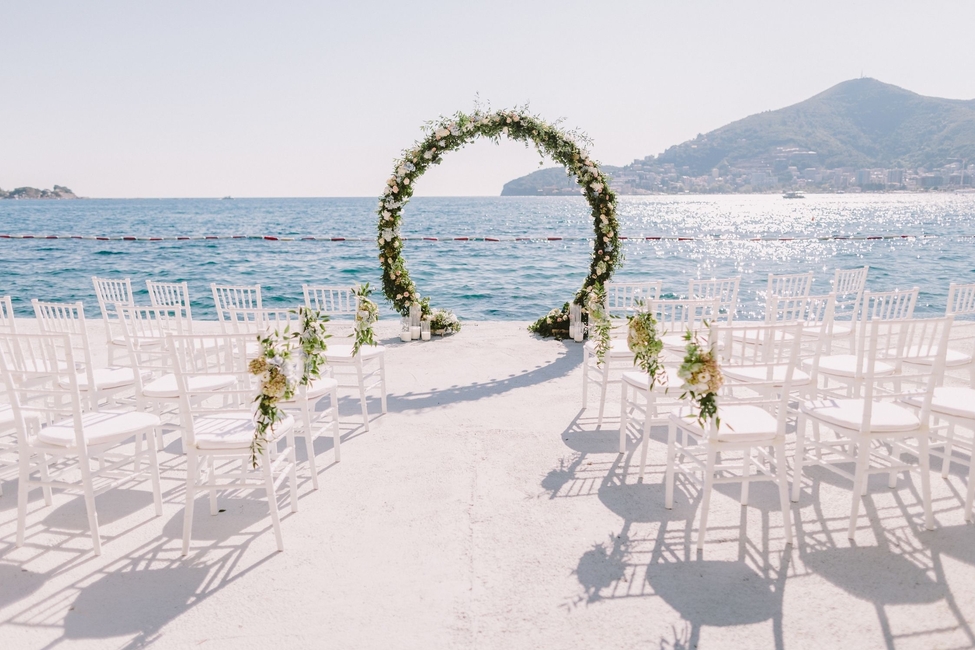We’ve all heard the phrase ‘your wedding, your way’. Personally, I’m thrilled to see more and more couples abandoning convention and planning the wedding they want rather than the wedding tradition dictates.

One option that’s becoming increasingly popular, especially for destination weddings, is the symbolic ceremony.
The term ‘symbolic’ has been adopted to describe a ceremony that has symbolic meaning but no legal or religious significance. To those present, it seems like any other marriage ceremony, albeit a very personal one, but it’s not legally binding. This means you need to plan a separate legal ceremony. This may seem like an unnecessary expense, but in the case of destination weddings it often costs less than handling the legal requirements for an overseas civil ceremony.
There are a few reasons. As I mentioned, opting for a symbolic ceremony can reduce some of the legal and administrative challenges associated with getting married overseas. For example, some Caribbean islands have quite a long residency requirement. I wrote about this in relation to Martinique for French Wedding Style. If you’re doing the ‘legal bit’ back home, you don’t need to worry about meeting these requirements or completing complicated paperwork. In certain places, you’ll also avoid your ceremony being conducted in a foreign language which lacks meaning for you and your guests.
A symbolic ceremony doesn’t tie you to choosing a licensed wedding venue either. You’ll need to take local customs and laws into consideration, but you should be able to say, ‘I do’ almost anywhere. The same goes for your officiant. You can book an experienced Wedding Celebrant, but you’re also free to ask a friend or loved one to perform the ceremony.
 Image by Malmoth Photography
Image by Malmoth Photography
Finally, planning a separate civil or religious ceremony back home gives you a chance to include guests who are otherwise unable to travel. You’ll find more advice on making your marriage official before jetting off in How to Do the ‘Legal Bit’ First and Plan a Heartfelt, Fun-Filled Party Later.
Whether you’re getting married overseas or right here in the UK, the best thing about choosing a symbolic wedding ceremony is the flexibility. You’re able to create something completely bespoke and personal to you. You can tell your love story, write your own vows, include your children, exchange rings, perform a handfasting ceremony or jump the broom. The options are endless! If this feels overwhelming and you’re not sure where to start, I’d recommend enlisting the help of a Wedding Celebrant.
From finding unique locations to sourcing the very best international suppliers, Benessamy is committed to removing the stress associated with long-distance wedding planning. We can handle negotiations, assist your guests, confirm bookings and co-ordinate every aspect of your overseas wedding or elopement. Discover our Destination Wedding Planning Services or get in touch to arrange a consultation.
Val x
Exchanging vows on the shore is wonderful, but what if a gentle sea breeze and sand between your toes isn’t part of your wedding vision?
The island of Jamaica is surrounded by the Caribbean Sea and covered in lush mountains, rainforests, and reef-lined beaches. The birthplace of reggae, it’s a location filled with unforgettable experiences, from crocodile safaris to horseback riding in the sea.

Val Mattinson is the founder and Head Planner at Benessamy, specialising in luxury weddings and beautifully curated celebrations across the UK and the Caribbean. With over 15 years of experience, Val is known for her calm, reassuring approach and meticulous attention to detail — supporting couples and hosts who want an unforgettable experience without the overwhelm.
If you’re beginning your planning journey and would like expert guidance, get in touch to arrange an introductory call. Val would love to help you create a celebration that feels thoughtful, joyful and effortlessly seamless.
edit_calendar Book an introductory call
call +44 (0)7787 422451
mail events@benessamy.co.uk
From historic castles to elegant country houses, discover seven quintessentially British wedding venues that offer a truly luxurious and unforgettable destination celebration in the UK.
Do you dream of getting married at a beautiful London wedding venue?